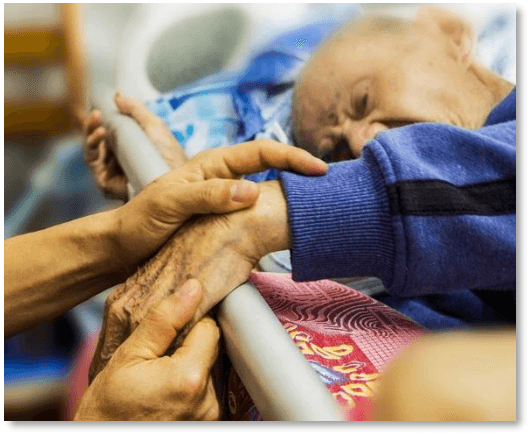The Remembrance of Death
One aid in the practice of asceticism is the remembrance of death. Indeed, many prayer books contain a prayer in which the person faces his or her bed before retiring and says, “O Lord Jesus Christ, lover of mankind, is this bed to be my grave, or will You shine upon my wretched soul with the light of another day?” In the life of a spiritually healthy person, remembrance of death is not morbid, but simply a mark of sanity: death is inevitable and eventually will come to us all, possibly suddenly and without warning. It is only sensible to be aware of this possibility. Far from casting a shadow over life’s joys and pleasures, it encourages us to enjoy them to the full. It puts everyday annoyances and irritations in perspective; if you knew for certain you were going to die tomorrow, how annoyed would you really be over the price of gasoline today?
In our Western secular culture, characterized as it is by (comparative) affluence, we tend to forget about death and consider sickness a temporary roadblock on our untroubled journey through life. Our secular culture has pushed death to the margins where it can be mostly ignored. Few people die at home anymore, but in hospitals, where they are quickly whisked from the hospital room to the morgue and from there (often) to the crematorium. Sometimes the body is not present for the funeral, which has been re-titled “a celebration of life,” because calling it “a funeral” sounds too funereal and depressing. Having effectively banished the robust Christian faith from our culture, we have nothing to console us in the face of our inevitable mortality, since our happy guesses and hopeful wishes can only take us so far.
In older days, sickness was considered inevitable and often led to death. It was not unusual for children to die in infancy or for mothers to die in childbirth. Adult men too were often swept away when disease passed through a town or village, and death was a part of life—something which could not be denied or marginalized. Nowadays, with better health care, we can sustain a bit more effectively the fantasy that we are immortal. But eventually a death in the family, whether sudden or expected, serves to bring us back to earth and reality.
The Christian faces sickness and death knowing that Christ has trampled down death, and that neither sickness nor death is to be feared as the greatest calamity. When Christians fall sick, they call upon the presbyters to anoint them and pray (James 5:14– 16). The sacrament of anointing is the instrument whereby the Lord brings joy and life, either through healing of one’s illness or bestowing of peace in the midst of the illness. Since one’s whole aim in life is to glorify God, one can glorify him either by giving thanks for physical healing, or by one’s patient endurance in sickness.

It is as St. Paul said, our desire is to honor Christ in our body and our affliction, whether by healing and life, or by continued sickness and death. If we are healed, that will mean thanksgiving for our recovery and a more fruitful life lived for Christ. If we do not recover but die, that is our gain, for we then enter more fully into life and joy. Sickness, though serious for the Christian as for everyone else, has been transfigured by Christ. If to live is Christ, then sickness cannot ultimately rob us of our joy.
When a Christian therefore falls sick, he or she should offer the sickness to Christ along with the rest of their life, asking that they might learn from it how to grow closer to Christ, and asking for such healing as the Lord wills to provide. Our secular society considers sickness as abnormal and therefore as intolerable. The Christian knows that it is part of life in this age, and one more stage in our journey to the Kingdom of God.
The reason that Christians do not fear sickness and death as others do is because they believe in Christ’s Resurrection, whereby He trampled down death by his own death and brought life and immortality to light. For us, all does not end in death, dust, and dissolution, but in triumph, life, and joy. Death is for us a passage to the Kingdom of God and a stage on our way to the final resurrection of our bodies on the Last Day, after the Second Coming.
On that day, Christ will raise our decomposed bodies from the ground and restore them, making them immortal and spiritual like his own risen flesh (1 Cor 15:42–49). We will then live in our resurrected bodies in a new heaven and a new earth, in which righteousness finally dwells (2 Pet 3:13), bearing an immortal and invincible weight of glory beyond all comparison (2 Cor 4:18).
This is the reason that, even now, Christian funerals are celebrations of the Lord’s victory, and why we can even make a funeral dirge into the song “Alleluia.”1 We are sad because of the temporary loss of our loved ones, but we rejoice knowing that death cannot separate us from Christ, and therefore cannot finally separate us from one another. We bury our dead, commending them to the victorious love of God, seeing their faces and giving the last kiss one final time, confident in our final joyful reunion on the Last Day.
Being a part of the Church, the Body of Christ, means that the union we experience with him cannot be severed by death. In life and in death, we remain a part of his Body, and remain one with each other. As members of his Body, we continue to pray for one another. Here on earth, we regularly commend our departed loved ones to God, confident that they in turn are praying for us as well.2